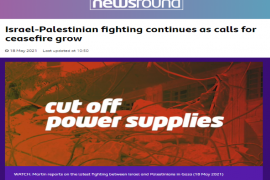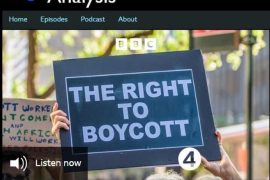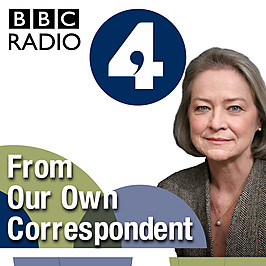Earlier this month we noted that the BBC was ignoring the renewal of attacks from the Gaza Strip using balloons, observing that:
“…it is worth noting that since such attacks began nearly two and a half years ago, the corporation’s Jerusalem bureau staff have produced very little reporting on the subject of the arson attacks and no coverage at all of the attacks using airborne explosive devices.”
On August 13th listeners to the BBC World Service radio programme ‘Newshour’ heard the first mention of the incendiary balloons that are one of the methods which have been used to launch attacks since early in the month.
Presenter Paul Henley introduced the item (from 17:44 here) by referring to Israel’s responses to those attacks which had caused over 80 fires in the two days prior to the broadcast, while failing to clarify to listeners the reason for the anti-terrorism measures imposed by Israel (and Egypt) in the form of the blockade.
[emphasis in italics in the original, emphasis in bold added]
Henley: “Now Israel says it will withhold fuel shipments to Gaza in response to the continued launch of incendiary balloons from the Palestinian territory. This morning Israeli defence forces said they had retaliated against Hamas, striking targets in Gaza including a military compound underground. An Israeli blockade of Gaza has been in place since 2007. A spokesman for Hamas has called this latest withdrawal of vital power supplies a grave act of aggression.”
However, rather than allowing BBC audiences around the world to hear the views of those affected by the attacks – for example Israeli firefighters, foresters, farmers and members of the civilian population living near the border with the Gaza Strip – ‘Newshour’ instead elected to promote the talking points of a professional anti-Israel activist.
Henley: “Tareq Baconi is senior analyst for the International Crisis Group on Israel and Palestine and has written extensively about what he calls the Palestinian resistance. He told me about these incendiary balloons.”
Despite the BBC having editorial guidelines which stipulate that audiences should be informed of the “particular viewpoint” of contributors, listeners were told nothing of the International Crisis Group’s (ICG) record, agenda and funding – including its receipt of donations from Qatar which are obviously relevant to the story, given that country’s history of support for Hamas.
Henley’s cryptic reference to his interviewee’s preferred description of Hamas did not adequaetely inform listeners that Tareq Baconi – formerly a Policy Fellow with Al Shabaka – has repeatedly made his own position on Hamas clear, including in his book:
“Hamas rules Gaza and the lives of the two million Palestinians who live there. Demonized in media and policy debates, various accusations and critical assumptions have been used to justify extreme military action against Hamas. The reality of Hamas is, of course, far more complex. Neither a democratic political party nor a terrorist group, Hamas is a multifaceted liberation organization, one rooted in the nationalist claims of the Palestinian people.” [emphasis added]
Baconi began by downplaying the incendiary balloons, avoiding the topic of the balloons carrying explosive devices and presenting his own rhetoric and falsehoods as “context”.
Baconi: “Well really the incendiary balloons are essentially flying kites; they’re essentially balloons that have explosive liquid in them that often causes fires. They do not have a very far range and they more often than not almost predominantly fall in open fields around the Gaza Strip and cause fires. Now we need to put this in context. The discourse around Gaza is often that Israel is responding to these balloons but we need to understand these balloons are barely a prick in the military arsenal that is Israel and they are a retaliation for a blockade which is itself an act of war, which is far more lethal and which continues to kill the Palestinians and force suffering in the Gaza Strip.”
Again making no effort to clarify why that blockade is in place, Henley went on:
Henley: “The public opinion in Israel is very much with the continuation of the blockade though, isn’t it? They feel threatened.”
Baconi: “Well the public opinion in Israel is also getting a partial view of the picture. The Gaza Strip has become in the Israeli public opinion as well as in much of international media synonymous with Hamas.”
Henley failed to remind listeners that that could well be because the terrorist organisation staged a violent coup in 2007 in order to take over the Gaza Strip.
Baconi: “There are 2 million Palestinians that live in the Gaza Strip in an area that’s 365 square kilometers: that means it’s one of the most densely populated spots on the planet. Most of those Palestinians are refugees. 80% live below poverty line and rely on humanitarian aid.”
Henley made no effort to challenge that highlighted false claim from Baconi – perhaps because it is one that the BBC itself is fond of promoting. Neither did he explain to listeners why there are still “refugees” in a territory which has been under exclusive Palestinian control for a decade and a half.
Baconi: “Infrastructure in the Gaza Strip has been decimated by the Israeli blockade. The healthcare sector, which is now faltering under the weight of Covid, has also been targeted by the Israeli occupation for…over the course of the past decade. This is the humanitarian situation in the Gaza Strip. It’s very fragile. The UN more than eight years ago declared that it would become uninhabitable by 2020. This is arguably the case already.”
That highlighted false claim was likewise not challenged by Henley and listeners were not informed that the healthcare sector in the Gaza Strip is not “faltering under the weight of Covid” at all seeing as at the time of broadcast, 71 of the 83 verified cases of Covid-19 in the Gaza Strip since the beginning of the pandemic had recovered.
Henley did however suggest to listeners that Israel had made an “agreement” with the terrorist organisation which it had now “broken”.
Henley: “Now when Israel says it will withhold fuel shipments, that’s about an ongoing agreement being broken – isn’t it? – to supply oil and gas into Gaza from Israel.”
Baconi once again portrayed his messaging as “context”:
Baconi: “Well exactly and we need to understand that in context. The agreement was…this is a ceasefire agreement that was agreed indirectly between the parties last November that Hamas would refrain from using missiles against Israel. In return Israel would allow the passage of fuel and other medical supplies into the Gaza Strip. Now more than eight months later the Gaza Strip continues to suffer under blockade and as a result Hamas and the authorities in Gaza decide that they need to increase pressure on Israel.”
The conflict last November (Operation Black Belt) was between Israel and the Palestinian Islamic Jihad, which of course has nothing to do with “fuel and other (sic) medical supplies”. The Times of Israel reported at the time that the ceasefire agreement:
“…stipulates that Palestinian factions must ensure a return to calm in Gaza and “maintain peace” during demonstrations, while Israel must stop hostilities and “ensure a ceasefire” during demonstrations by Palestinians.”
Neither Henley nor Baconi bothered to inform listeners that since that ‘ceasefire agreement’ over 168 missile attacks against Israeli civilians were launched by terror factions in the Gaza Strip or that Hamas recently dismissed an opportunity to bring an end to the blockade.
Baconi’s “context” continued with the lie that Israel targets sewage treatment plants and water sanitation plants.
Baconi: ‘Now we need to understand this in context of Covid as well. The reality in the Gaza Strip is one where the idea of quarantining or social distancing just doesn’t apply. The basic hygiene, sanitation services, presence of water – more than 96% of water in Gaza is unfit for consumption. This is the result of Israeli targeting of sewage treatment plants, water sanitation plants that make basic life in Gaza quite difficult.”
The ‘Great Return March’ was suspended in December 2019 but Baconi went on to claim that people injured during that Hamas-organised agitprop are still ‘overwhelming’ the Gaza Strip’s health services. His claim that 36,000 people were “injured by Israeli live fire” is not supported by figures from UNOCHA which state that 22% of the total of 36,143 people injured during the rioting were hurt by live fire.
Baconi: “The healthcare sector is overwhelmed by more than 36,000 Palestinians who were injured by Israeli live fire in response to the protests – the Great March of Return protests – that have happened over the course of the past two years. What this means now is that the healthcare sector has to deal with even greater shortage of services as a result of the cut in electricity. So there’s 65 ventilators in the Gaza Strip for 2 million Palestinians. If there’s less supply of electricity as a result of these fuel shortages, who gets the treatment? There’s kidney dialysis machines, incubators for babies, ventilators. All of those rely on electricity which is obviously now in short supply. Before Israel’s government made this decision electricity in Gaza was 8 hours on, 8 hours off. Now it might go down to zero and the healthcare sector has a very, very difficult choice to make.”
Henley failed to inform listeners that even if Israel does not supply fuel to the Gaza Strip’s sole power plant, the electricity supply in the territory will not “go down to zero” because that plant only supplies nearly a third of the Gaza Strip’s electricity.
Henley closed the item by reading out a statement from the IDF.
Henley: “That was Tareq Baconi from the International Crisis Group on Israel stroke Palestine. The Israeli Defense Force has released this statement on the subject – the IDF views any terror activity, it says, against Israel with great severity and will continue operating as necessary against attempts to harm Israeli civilians. The Hamas terror organisation is responsible for all events transpiring in the Gaza Strip and emanating from it and will bear the consequences for terror activity against Israeli civilians.”
Clearly the inclusion of that box-ticking statement at the end of the item does nothing to mitigate the politically motivated disinformation and falsehoods which Tareq Baconi was allowed to promote unchallenged to the BBC’s worldwide audiences in the corporation’s first report on the renewal of balloon terrorism from the Gaza Strip.
Related Articles:
BBC WS RADIO’S ‘CONTEXT’: FALSEHOODS ABOUT COUNTER TERRORISM MEASURES
CRITICS SLAM PRO-BDS ARTICLE FROM BBC QUOTED NGO WRITER
BBC NEWS AGAIN IGNORES BALLOON TERRORISM FROM THE GAZA STRIP






what do you expect from the bbc?
it’s institutionally anti israel.
it always has been and will never change until they are sued for defamation, slander and bias. not much chance of that happening. maybe they should release the balen report, not much chance of that happening either.
i recommend you just stop paying the license and boycott it.